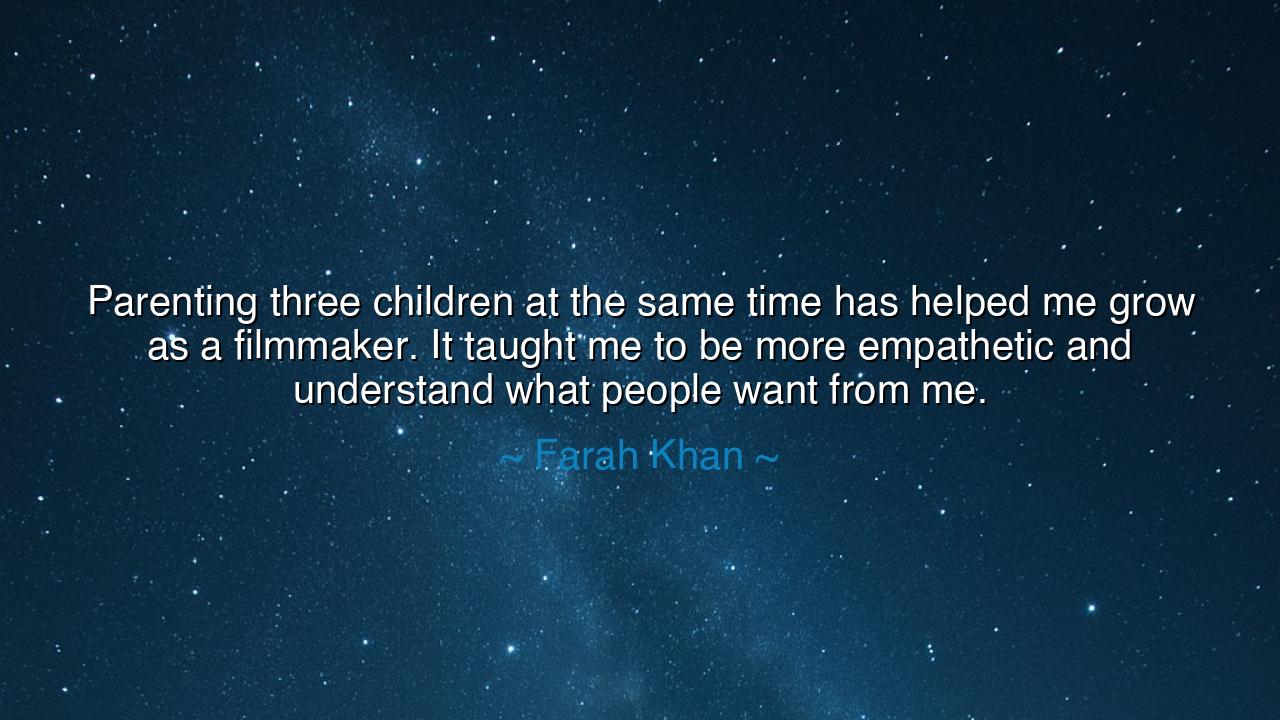
Parenting three children at the same time has helped me grow as
Parenting three children at the same time has helped me grow as a filmmaker. It taught me to be more empathetic and understand what people want from me.






Farah Khan, a creator of images, stories, and worlds, once spoke with the gravity of one who has walked two great journeys at once: “Parenting three children at the same time has helped me grow as a filmmaker. It taught me to be more empathetic and understand what people want from me.” These words reveal a truth that stretches across all human endeavor—that the lessons of the home echo into the halls of work, and that to nurture life is to deepen the soul in every craft.
The origin of this wisdom lies in Khan’s own life, where the demands of raising three children at once merged with her calling as a filmmaker. In the chaos of parenthood—so many needs, so many voices, so many desires—she found herself tempered like steel in fire. The constant balancing of care, patience, and discipline did not weaken her creativity; it sharpened it. She learned not only to command but to listen, not only to guide but to empathize. Thus, the lessons of the nursery became the lessons of the studio, and her artistry was made richer by her motherhood.
History bears witness to this union of family and craft. Think of Leon Battista Alberti, the Renaissance polymath, who described the family as a “little commonwealth,” teaching lessons of order, harmony, and empathy that shaped the wider republic. Or recall Leo Tolstoy, whose vast family life filled his soul with both trials and tenderness, and whose novels brim with insight into human longing because he himself had been schooled by the daily labors of fatherhood. Like Khan, they discovered that parenting is not separate from art—it is a teacher of art, refining the heart that creates.
Farah Khan’s words also remind us that empathy is born not in silence, but in the noise of many voices. A parent learns that every child is different, each with unique needs and desires. To meet these without favoritism or neglect is to cultivate a sensitivity that sees beyond the self. This same empathy, carried into filmmaking, allowed her to understand what her audiences, her actors, her collaborators sought from her. Parenthood, in its endless demands, became a school for leadership, for patience, for seeing the hidden wants of others.
And yet, there is heroism in her confession. To raise three children is already a feat of endurance. To raise them while continuing the pursuit of artistic vision is a testament to resilience. Her words show us that family need not be a hindrance to ambition, but a crucible in which ambition is purified, softened by love, and guided toward serving others rather than the self alone. Parenting, in her case, did not diminish her creative strength—it magnified it by grounding it in humanity.
The lesson for us is radiant: do not divide life into compartments of family and work, as if one steals from the other. Instead, see them as mirrors, each reflecting wisdom into the other. Let the tenderness and empathy learned in the home inform your labor in the world. Let the discipline and vision honed in your craft enrich your care at home. In this way, your life becomes a unity, not a division, and every role you play strengthens every other.
Therefore, let Farah Khan’s words be remembered: “Parenting… has helped me grow as a filmmaker. It taught me to be more empathetic and understand what people want from me.” In them we hear the ancient truth that to raise others is also to raise oneself. Whether in art, in work, or in daily living, the lessons of the family are eternal teachers. If you embrace them, you will not only grow as a parent, but as a human being whose work, love, and life are shaped by empathy, patience, and strength.






AAdministratorAdministrator
Welcome, honored guests. Please leave a comment, we will respond soon